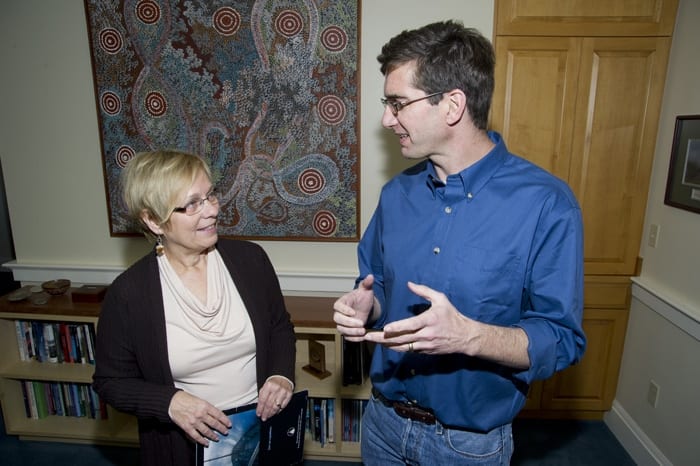News Releases
Hal Caswell Wins Humboldt Research Award
Hal Caswell, a senior scientist in the Biology Department at Woods Hole Oceanographic Institution (WHOI), was awarded a 2010 Humboldt Research Award by the Alexander von Humboldt Foundation in Bonn,…
Read MoreFirst Study of Dispersants in Gulf Spill Suggests a Prolonged Deepwater Fate
To combat last year?s Deepwater Horizon oil spill, nearly 800,000 gallons of chemical dispersant were injected directly into the oil and gas flow coming out of the wellhead nearly one mile deep in the Gulf of Mexico. Now, as scientists begin to assess how well the strategy worked at breaking up oil droplets, Woods Hole Oceanographic Institution (WHOI) chemist Elizabeth B. Kujawinski and her colleagues report that a major component of the dispersant itself was contained within an oil-gas-laden plume in the deep ocean and had still not degraded some three months after it was applied.
Read MoreWHOI’s Avery, Doney Selected AAAS Fellows
Woods Hole Oceanographic Institution (WHOI) President and Director Susan K. Avery and Senior Scientist Scott C. Doney have been elected Fellows of the American Association for the Advancement of Science (AAAS).
Read More“Hot-Bunking” Bacterium Recycles Iron to Boost Ocean Metabolism
In the vast ocean where an essential nutrient?iron?is scarce, a marine bacterium that launches the ocean food web survives by using a remarkable biochemical trick: It recycles iron.
Read MoreWHOI Data Library to House and Preserve Ocean Ecosystem Archives
Alexander Graham Bell once said that when one door closes another one opens, and the open doors of the Woods Hole Oceanographic Institution (WHOI) Data Library and Archives are making it possible to help preserve the voluminous archives of GLOBEC, a study of Global Ocean Ecosystem Dynamics, which closed at the end of 2009.
Read MoreAlvin Upgrade Project Featured at American Geophysical Union Meeting
The multi-million dollar upgrades to the storied deep-diving research submersible Alvin will be the focus of a press conference on December 15 at the 2010 American Geophysical Union meeting in San Francisco, CA. Upgrade Project Principal Investigator Susan Humphris, a WHOI geologist, will provide details of the improvements to the sub’s capabilities and its value to the U.S. scientific community.
Read MoreNational Deep Submergence Facility Vehicles Assist in Response to Deepwater Horizon Oil Spill
The U.S. National Deep Submergence Facility (NDSF) has had a growing and important role in the ocean science community’s response to the 2010 Deepwater Horizon oil spill in the Gulf…
Read MoreTiny Protozoa May Hold Key to World Water Safety
Right now, it looks a little like one of those plastic containers you might fill with gasoline when your car has run dry. But Scott Gallager is not headed to the nearest Mobil station. The Woods Hole Oceanographic Institution (WHOI) biologist has other, grander plans for his revolutionary Swimming Behavioral Spectrophotometer (SBS), which employs one-celled protozoa to detect toxins in water sources.
Read MoreWHOI Website Will Take Viewers Deep into the Gulf
It may take years before scientists determine the full impact of the 2010 Deepwater Horizon oil spill in the Gulf of Mexico. But, utilizing the human-occupied submersible Alvin and the autonomous underwater vehicle (AUV) Sentry, researchers are about to investigate?and view first-hand?the possible effects of the spill at the bottom of the Gulf. And, from Dec. 6-14, the mission will be relayed to the public as it happens on the Woods Hole Oceanographic Institution?s (WHOI) Dive and Discover website (http://divediscover.whoi.edu).
Read MoreNovel Ocean-Crust Mechanism Could Affect World’s Carbon Budget
The Earth is constantly manufacturing new crust, spewing molten magma up along undersea ridges at the boundaries of tectonic plates. The process is critical to the planet?s metabolism, including the cycle of underwater life and the delicate balance of carbon in the ocean and atmosphere. Now, scientists at the Woods Hole Oceanographic Institution (WHOI) have observed ocean crust forming in an entirely unexpected way?one that may influence those cycles of life and carbon and, in turn, affect the much-discussed future of the world?s climate.
Read MoreWHOI Receives Gordon and Betty Moore Foundation Grant for Oceanography Imaging Informatics
In a significant step toward a new era in the collection and understanding of ocean science data, the Woods Hole Oceanographic Institution (WHOI) has received a grant of more than $2 million from the Gordon and Betty Moore Foundation for work in imaging informatics in oceanography.
Read MoreWHOI Launches Ocean Awareness Video Campaign in NYC
The Woods Hole Oceanographic Institution (WHOI) has launched a video campaign on the world’s biggest stage to highlight the importance of the planet’s largest life-sustaining feature—the ocean. The three-month ocean…
Read MoreSquid Studies Provide Valuable Insights Into Hearing Mechanisms
The ordinary squid, Loligo pealii?best known until now as a kind of floating buffet for just about any fish in the sea?may be on the verge of becoming a scientific superstar, providing clues about the origin and evolution of the sense of hearing.
Read MoreListen Up: Ocean Acidification Poses Little Threat to Whales? Hearing
Contrary to some previous, highly publicized, reports, ocean acidification is not likely to worsen the hearing of whales and other animals, according to a Woods Hole Oceanographic Institution (WHOI)…
Read MoreWhat Lives in the Sea?
The Census of Marine Life, a ten-year project to catalog all life in the sea, discovered more than 6,000 new species during its “decade of discovery,” scientists reported as they…
Read MoreResearchers Find Widespread Floating Plastic Debris in the Western North Atlantic Ocean
Despite growing awareness of the problem of plastic pollution in the world’s oceans, little solid scientific information existed to illustrate the nature and scope of the issue. This week, a…
Read MoreWHOI Scientists Map and Confirm Origin of Large, Underwater Hydrocarbon Plume in Gulf
Scientists at the Woods Hole Oceanographic Institution (WHOI) detected and characterized a plume of hydrocarbons that is at least 22 miles long and more than 3,000 feet below the surface of the Gulf of Mexico, a residue of the BP Deepwater Horizon oil spill. The work presents a forensic snapshot of the plume characteristics in June and is reported in a study appearing in the Aug. 19 issue of the journal Science.
Read MoreWHOI Announces 2010 Ocean Science Journalism Fellows
Ten writers and multimedia science journalists from the U.S. and Great Britain have been selected to participate in the competitive Woods Hole Oceanographic Institution (WHOI) Ocean Science Journalism Fellowship program.…
Read MoreThe Salp: Nature’s Near-Perfect Little Engine Just Got Better
What if trains, planes, and automobiles all were powered simply by the air through which they move? Moreover, what if their exhaust and byproducts helped the environment?
Well, such an energy-efficient, self-propelling mechanism already exists in nature. The salp, a smallish, barrel-shaped organism that resembles a kind of streamlined jellyfish, gets everything it needs from the ocean waters to feed and propel itself. And, scientists believe its waste material may actually help remove carbon dioxide (CO2) from the upper ocean and the atmosphere.
WHOI To Mark New Lab with Groundbreaking Celebration
Equipped with an $8.1 million federal Recovery Act grant and a shovel, the Woods Hole Oceanographic Institution (WHOI) will celebrate the groundbreaking of its new Laboratory for Ocean Sensors and Observing Systems (LOSOS) at 11 a.m. on Wednesday, Aug. 4, at the Clark Laboratory on the Institution?s Quissett Campus.
Read MoreExpedition to Mid-Cayman Rise Identifies Unusual Variety of Deep Sea Vents
deep-sea hydrothermal vents Mid-Cayman Rise Woods Hole Oceanographic Institution (WHOI) Proceedings of the National Academy of Sciences NASA-funded search extreme environments origins and evolution life
Read MoreWHOI Science Mission to Study Deepwater Horizon Spill Using Mass Spectrometry and AUV Sentry
A multidisciplinary team of investigators from Woods Hole Oceanographic Institution embarked June 17 on a twelve-day research effort in the Gulf of Mexico aboard the R/V Endeavor, conducting three simultaneous…
Read MoreSharks sniff out their prey, one nostril at a time
It turns out the old saying is right — the nose really does know. And when it comes to sharks, the nostrils are particularly discriminating. Combined with the ability to…
Read MoreWHOI Participates in Meeting Aimed at Finding Solutions to Control or Stop Oil Spill
On June 1, 2010, members of the staff of the Woods Hole Oceanographic Institution (WHOI) participated in a meeting at the Environmental Protection Agency headquarters in Washington, D.C., to consider…
Read More

